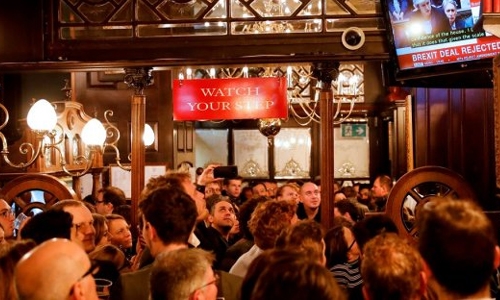Britain is a nation in desperate need of a driver
This week, as an anxious Britain prepared to witness Prime Minister Theresa May’s Brexit plan crashing to defeat, Nicholas Soames, Winston Churchill’s grandson, tweeted out one of his grandfather’s solemn warnings from the 1930s. Soames, a Conservative politician, repeated lines from a poem, by Edwin J Milliken, that his grandfather had quoted to express his despair at Britain’s political paralysis in the face of the Nazi threat: “Who is in charge of the clattering train? The axles creak, and the couplings strain.
For the pace is hot and the points are near, and Sleep hath deadened the driver’s ear, and signals flash through the night in vain. Who is in charge of the clattering train?” Nobody knows. With May’s cabinet, the country, political parties and Parliament all hopelessly split over how or whether to carry out Brexit, Britain’s political universe is imploding and so are its political norms. At any other time, a prime minister who lost her government’s flagship policy would be expected to resign. On Jan. 15, May’s Brexit plan was defeated by a vote of 432-202. Immediately afterward, Jeremy Corbyn, the leader of the opposition Labour Party, called a vote of no-confidence.
That will almost certainly be defeated on Jan. 16. Nobody expects May to leave office this week. Before the vote, she had told her cabinet that no matter how much she lost by, she intended to stay on and steer a form of Brexit through. She is hoping to keep her hands on the wheel, even though most of her passengers are rebelling against her destination. But now that the vote is over, all of the plots for and against her, and for and against each possible permutation of Brexit, will be unleashed. Every faction in each of the two main parties will be fighting and scheming for its preferred result, from a “no-deal Brexit” to a softer departure that leaves Britain closer to the European Union to abandoning the idea of leaving altogether.
Predicting who will win is impossible because none of these factions has a majority and no one knows how or whether they will form alliances. Politicians and journalists are frantically trying to game the next few weeks. Every outcome is unlikely and most seem utterly implausible, yet everything — from another indecisive election to a national unity government — is being suggested. I recently asked three senior Conservative politicians at the heart of these machinations which future Britain would be facing in 10 weeks, when the Brexit clock runs out. “God alone knows,” said one cabinet minister, a keen Brexiteer. “No one knows,” said the second, a reluctant Brexit backer.
“Haven’t a clue,” said one of the key campaigners for a second referendum. Everyone is horribly — or jubilantly — aware that if within the next few weeks Parliament cannot agree on May’s deal, or on any other deal, or on throwing the issue back to the country in a referendum, then Britain will tumble out of the European Union at the end of March, smashing its economy and its relationships with its closest trading partners. With the ruling Conservatives so divided, Corbyn’s Labour is in a potentially powerful position.
If it threw its votes behind the Tories backing May’s agreement, or supported a second referendum, or decided to back a softer Brexit that retained much closer links with Europe — “Norway Plus,” as it’s known — those proposals would likely pass. But so far, the party has refused to commit itself to any such solutions because it, too, is split between those who want to leave the European Union and those who want to remain.
So far it has suited Corbyn, a longtime euroskeptic, to stay on the fence, loftily opposing all of the Tories’ proposals and declaring that if only Labour were in power, it could magically achieve a better Brexit deal. He’s reluctant to back anything that the Tories propose because he calculates that doing so will implicate him in Brexit’s inevitable economic damage. He doesn’t want a second referendum because he doesn’t know which side to back. This comfortable evasion cannot be sustained after May’s crushing defeat on Jan 15.
Labour will have to pick sides and live with the consequences. Members of Parliament and leaders in all parties will be faced with the starkest of choices: Britain’s future will be decided within the next month. Neither party has enough votes to make that choice on its own. The question now is whether the leadership on both sides has the will, imagination or character to reach out to the other and avoid a no-deal disaster. There’s nothing in their careers to suggest that is so. After her defeat, May announced that she wanted to talk with the opposition to discover what compromise members of Parliament were prepared to support. An enraged Corbyn retorted that over the previous two years she had closed down every attempt at dialogue, and her only priority had been the Conservative Party.
It is Britain’s misfortune that at this moment, when cooperation and statesmanship are needed to prevent political and economic disaster, both the prime minister and the leader of the opposition are known for being cautious, obstinate, unimaginative, tribal and charmless. That’s why the wilder suggestion now is that moderate Labour and Tory rebels may step forward and declare themselves a new parliamentary grouping, prepared to lead the country in a government of national unity away from the cliff’s edge.
It feels preposterous — but so does almost everything else. Can May and Corbyn suspend their instinctive hostility? Can a fleet of courageous men and women in Parliament step forward if not? Britain is in desperate need of a driver who can seize control of the clattering train.
Related Posts

